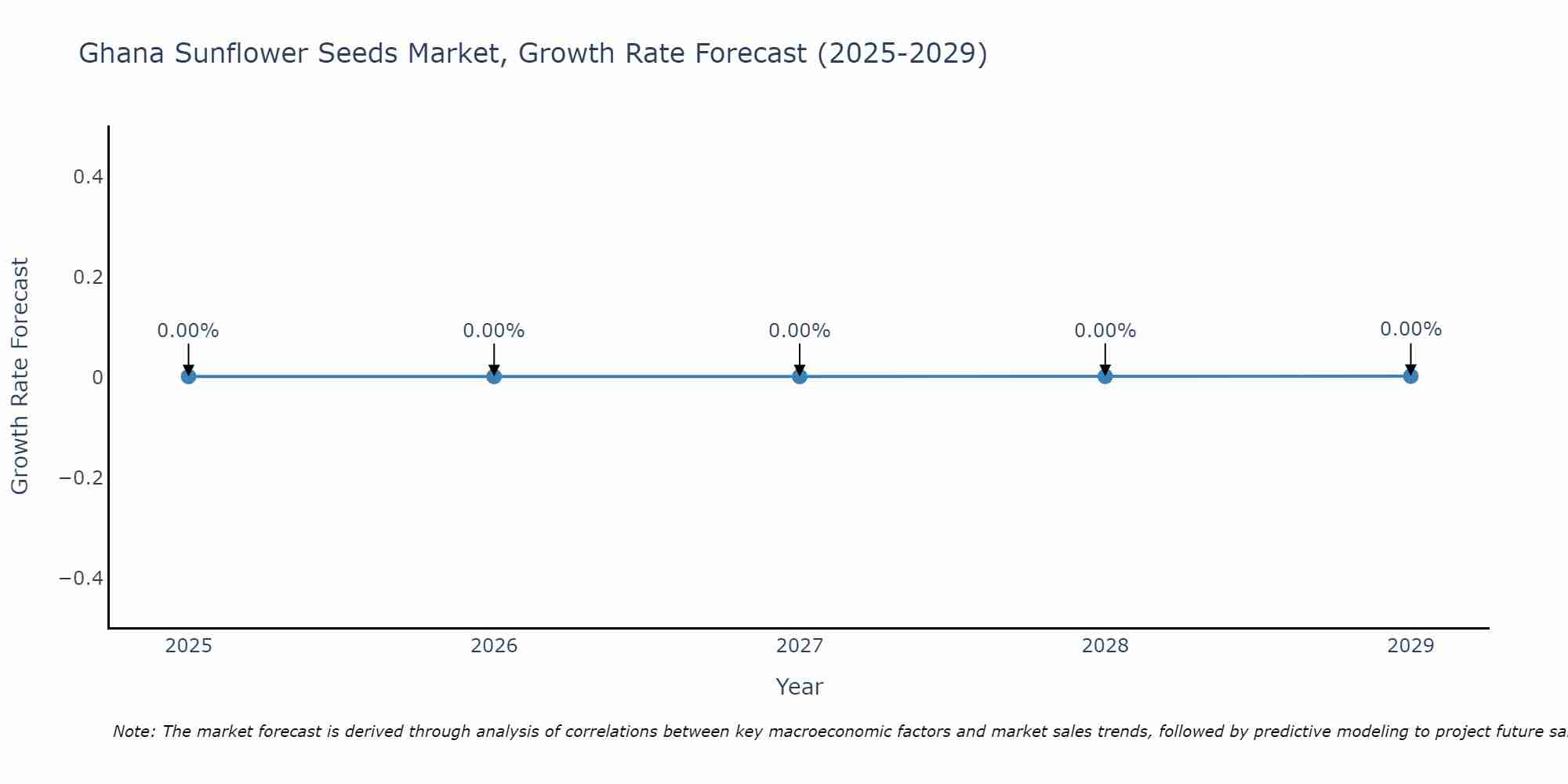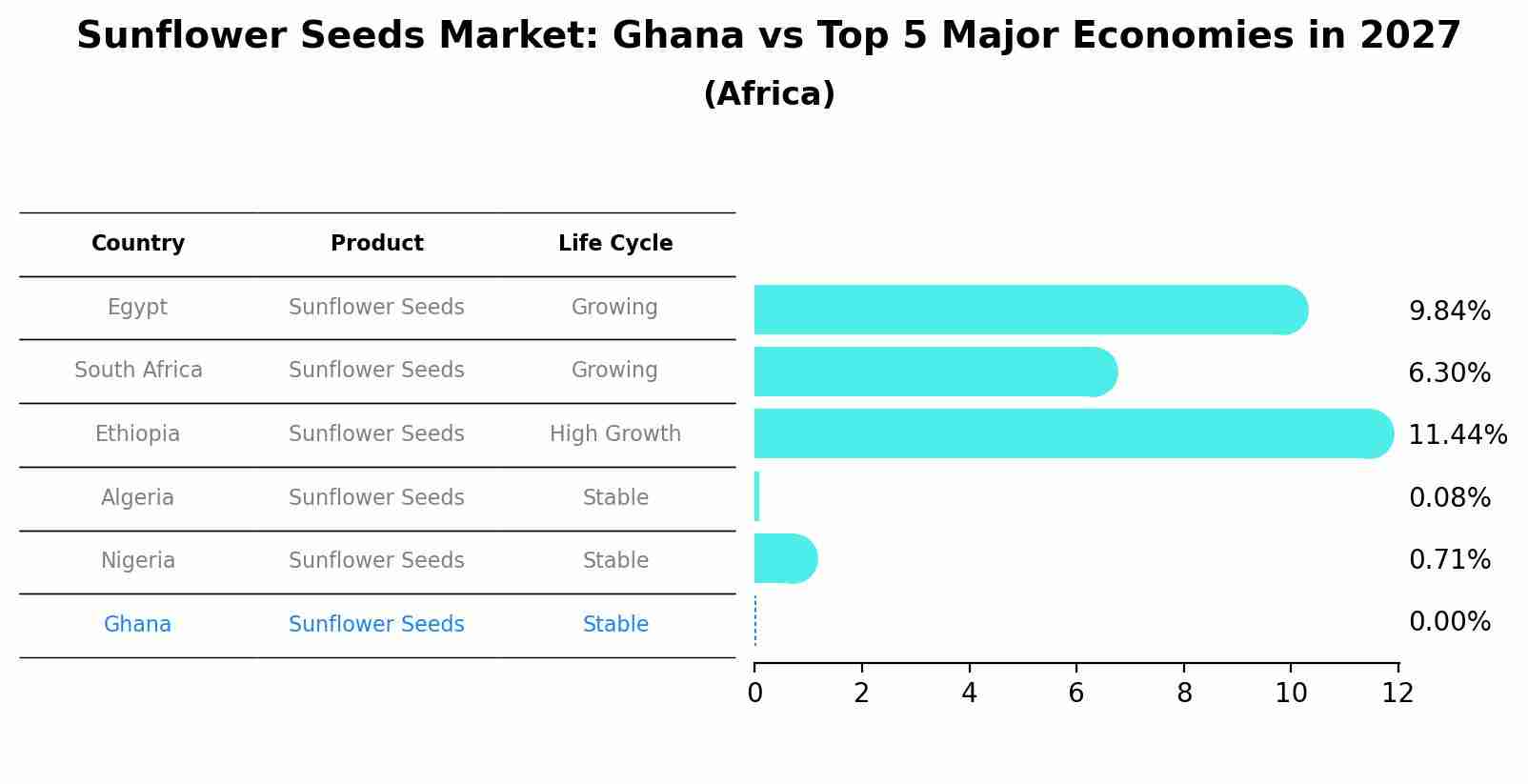Ghana Sunflower Seeds Market (2025-2031) Outlook | Share, Companies, Industry, Value, Size, Growth, Forecast, Revenue, Analysis & Trends
| Product Code: ETC225056 | Publication Date: Aug 2022 | Updated Date: Aug 2025 | Product Type: Market Research Report | |
| Publisher: 6Wresearch | Author: Vasudha | No. of Pages: 75 | No. of Figures: 35 | No. of Tables: 20 |
Ghana Sunflower Seeds Market Size Growth Rate
The Ghana Sunflower Seeds Market is poised for steady growth rate improvements from 2025 to 2029. The growth rate starts at 0.00% in 2025 and reaches 0.00% by 2029.

Sunflower Seeds Market: Ghana vs Top 5 Major Economies in 2027 (Africa)
Ghana's Sunflower Seeds market is anticipated to experience a stable growth rate of 0.00% by 2027, reflecting trends observed in the largest economy Egypt, followed by South Africa, Ethiopia, Algeria and Nigeria.

Ghana Sunflower Seeds Market Overview
The Ghana sunflower seeds market is experiencing steady growth driven by increasing awareness of the health benefits associated with sunflower seeds consumption. These seeds are rich in nutrients such as Vitamin E, magnesium, and selenium, making them popular among health-conscious consumers. The market is also benefiting from the growing demand for sunflower oil, which is derived from sunflower seeds and widely used in cooking. Local farmers in Ghana are increasingly cultivating sunflower crops to meet this demand, leading to a rise in domestic production. However, challenges such as limited access to modern farming techniques and variations in weather patterns pose potential risks to the market`s growth. Overall, the Ghana sunflower seeds market presents opportunities for both local farmers and international suppliers looking to expand their presence in the region.
Ghana Sunflower Seeds Market Trends
The Ghana Sunflower Seeds Market is experiencing a growing demand driven by the increasing awareness of the health benefits associated with sunflower seeds. Consumers are increasingly turning to sunflower seeds as a nutritious snack option due to their high vitamin E content, antioxidant properties, and potential to reduce the risk of heart disease. Additionally, the market is witnessing a surge in the use of sunflower seeds in various food products such as baked goods, salads, and snacks, further fueling the demand. Local producers are expanding their sunflower cultivation to meet the rising demand, leading to a competitive market landscape. The trend towards healthy eating and the versatile applications of sunflower seeds are expected to continue driving growth in the Ghana Sunflower Seeds Market in the foreseeable future.
Ghana Sunflower Seeds Market Challenges
In the Ghana Sunflower Seeds Market, some challenges that are commonly faced include inconsistent weather patterns affecting crop yields, limited access to modern agricultural technology and practices leading to lower productivity, inadequate storage facilities resulting in post-harvest losses, and competition from imported sunflower seeds. Additionally, there may be issues related to access to finance for small-scale farmers, lack of quality control mechanisms along the value chain, and limited market infrastructure for efficient distribution and marketing of sunflower seeds. Addressing these challenges requires investments in agricultural research and extension services, improving access to credit facilities, promoting the adoption of sustainable farming practices, and enhancing market linkages for local sunflower seed producers.
Ghana Sunflower Seeds Market Investment Opportunities
The Ghana Sunflower Seeds Market presents promising investment opportunities due to increasing consumer awareness of the health benefits of sunflower seeds, coupled with a growing demand for natural and nutritious snacks. Key areas for investment include the production and processing of sunflower seeds to cater to the local market and potentially export opportunities. Additionally, investing in research and development to enhance seed quality, innovate new products, and improve production efficiency can provide a competitive edge in the market. Collaborating with local farmers to secure a sustainable and consistent supply of high-quality sunflower seeds can also be a strategic investment approach. Overall, the Ghana Sunflower Seeds Market offers potential for growth and diversification within the agricultural sector.
Ghana Sunflower Seeds Market Government Policy
The Ghanaian government has implemented various policies to support the sunflower seeds market in the country. These include the Planting for Food and Jobs program, which provides subsidies for inputs such as seeds and fertilizers to smallholder farmers growing sunflower seeds. Additionally, the government has prioritized the development of the oilseeds sector, including sunflower seeds, through the preparation of a National Oil Palm Development Strategy. This strategy aims to increase local production of oilseeds, reduce import dependency, and promote value addition within the sector. Furthermore, the government has established the Ghana National Seed Council to regulate the quality of seeds in the country, ensuring that farmers have access to high-quality sunflower seeds for cultivation.
Ghana Sunflower Seeds Market Future Outlook
The future outlook for the Ghana Sunflower Seeds Market appears promising, driven by increasing consumer awareness of the health benefits associated with sunflower seeds. With a growing focus on healthy snacking options and the rising demand for plant-based proteins, sunflower seeds are likely to gain popularity as a versatile and nutritious food source. Additionally, the agricultural sector in Ghana is expected to continue investing in the production and processing of sunflower seeds, thereby enhancing the market`s competitiveness and sustainability. However, challenges such as climate change and fluctuating global market prices may impact the industry`s growth trajectory. Overall, the Ghana Sunflower Seeds Market is poised for expansion, supported by changing consumer preferences and advancements in agricultural practices.
Key Highlights of the Report:
- Ghana Sunflower Seeds Market Outlook
- Market Size of Ghana Sunflower Seeds Market, 2024
- Forecast of Ghana Sunflower Seeds Market, 2031
- Historical Data and Forecast of Ghana Sunflower Seeds Revenues & Volume for the Period 2021 - 2031
- Ghana Sunflower Seeds Market Trend Evolution
- Ghana Sunflower Seeds Market Drivers and Challenges
- Ghana Sunflower Seeds Price Trends
- Ghana Sunflower Seeds Porter's Five Forces
- Ghana Sunflower Seeds Industry Life Cycle
- Historical Data and Forecast of Ghana Sunflower Seeds Market Revenues & Volume By Type for the Period 2021 - 2031
- Historical Data and Forecast of Ghana Sunflower Seeds Market Revenues & Volume By Open Pollinated for the Period 2021 - 2031
- Historical Data and Forecast of Ghana Sunflower Seeds Market Revenues & Volume By Hybrids for the Period 2021 - 2031
- Ghana Sunflower Seeds Import Export Trade Statistics
- Market Opportunity Assessment By Type
- Ghana Sunflower Seeds Top Companies Market Share
- Ghana Sunflower Seeds Competitive Benchmarking By Technical and Operational Parameters
- Ghana Sunflower Seeds Company Profiles
- Ghana Sunflower Seeds Key Strategic Recommendations
Frequently Asked Questions About the Market Study (FAQs):
1 Executive Summary |
2 Introduction |
2.1 Key Highlights of the Report |
2.2 Report Description |
2.3 Market Scope & Segmentation |
2.4 Research Methodology |
2.5 Assumptions |
3 Ghana Sunflower Seeds Market Overview |
3.1 Ghana Country Macro Economic Indicators |
3.2 Ghana Sunflower Seeds Market Revenues & Volume, 2021 & 2031F |
3.3 Ghana Sunflower Seeds Market - Industry Life Cycle |
3.4 Ghana Sunflower Seeds Market - Porter's Five Forces |
3.5 Ghana Sunflower Seeds Market Revenues & Volume Share, By Type, 2021 & 2031F |
4 Ghana Sunflower Seeds Market Dynamics |
4.1 Impact Analysis |
4.2 Market Drivers |
4.2.1 Increasing consumer awareness about the health benefits of sunflower seeds |
4.2.2 Growing demand for natural and organic food products |
4.2.3 Government initiatives promoting sunflower cultivation and processing in Ghana |
4.3 Market Restraints |
4.3.1 Fluctuations in global sunflower seed prices |
4.3.2 Climate change affecting sunflower seed production in Ghana |
4.3.3 Lack of advanced technology for processing sunflower seeds in the local market |
5 Ghana Sunflower Seeds Market Trends |
6 Ghana Sunflower Seeds Market, By Types |
6.1 Ghana Sunflower Seeds Market, By Type |
6.1.1 Overview and Analysis |
6.1.2 Ghana Sunflower Seeds Market Revenues & Volume, By Type, 2021 - 2031F |
6.1.3 Ghana Sunflower Seeds Market Revenues & Volume, By Open Pollinated, 2021 - 2031F |
6.1.4 Ghana Sunflower Seeds Market Revenues & Volume, By Hybrids, 2021 - 2031F |
7 Ghana Sunflower Seeds Market Import-Export Trade Statistics |
7.1 Ghana Sunflower Seeds Market Export to Major Countries |
7.2 Ghana Sunflower Seeds Market Imports from Major Countries |
8 Ghana Sunflower Seeds Market Key Performance Indicators |
8.1 Average selling price of sunflower seeds in Ghana |
8.2 Number of new product launches using sunflower seeds as an ingredient |
8.3 Percentage of sunflower seed farmers adopting sustainable agricultural practices |
9 Ghana Sunflower Seeds Market - Opportunity Assessment |
9.1 Ghana Sunflower Seeds Market Opportunity Assessment, By Type, 2021 & 2031F |
10 Ghana Sunflower Seeds Market - Competitive Landscape |
10.1 Ghana Sunflower Seeds Market Revenue Share, By Companies, 2024 |
10.2 Ghana Sunflower Seeds Market Competitive Benchmarking, By Operating and Technical Parameters |
11 Company Profiles |
12 Recommendations |
13 Disclaimer |
- Single User License$ 1,995
- Department License$ 2,400
- Site License$ 3,120
- Global License$ 3,795
Search
Related Reports
- ASEAN Bearings Market (2025-2031) | Strategy, Consumer Insights, Analysis, Investment Trends, Opportunities, Growth, Size, Share, Industry, Revenue, Segments, Value, Segmentation, Supply, Forecast, Restraints, Outlook, Competition, Drivers, Trends, Demand, Pricing Analysis, Competitive, Strategic Insights, Companies, Challenges
- Europe Flooring Market (2025-2031) | Outlook, Share, Industry, Trends, Forecast, Companies, Revenue, Size, Analysis, Growth & Value
- Saudi Arabia Manlift Market (2025-2031) | Outlook, Size, Growth, Trends, Companies, Industry, Revenue, Value, Share, Forecast & Analysis
- Uganda Excavator, Crane, and Wheel Loaders Market (2025-2031) | Strategy, Consumer Insights, Analysis, Investment Trends, Opportunities, Growth, Size, Share, Industry, Revenue, Segments, Value, Segmentation, Supply, Forecast, Restraints, Outlook, Competition, Drivers, Trends, Demand, Pricing Analysis, Competitive, Strategic Insights, Companies, Challenges
- Rwanda Excavator, Crane, and Wheel Loaders Market (2025-2031) | Strategy, Consumer Insights, Analysis, Investment Trends, Opportunities, Growth, Size, Share, Industry, Revenue, Segments, Value, Segmentation, Supply, Forecast, Restraints, Outlook, Competition, Drivers, Trends, Demand, Pricing Analysis, Competitive, Strategic Insights, Companies, Challenges
- Kenya Excavator, Crane, and Wheel Loaders Market (2025-2031) | Strategy, Consumer Insights, Analysis, Investment Trends, Opportunities, Growth, Size, Share, Industry, Revenue, Segments, Value, Segmentation, Supply, Forecast, Restraints, Outlook, Competition, Drivers, Trends, Demand, Pricing Analysis, Competitive, Strategic Insights, Companies, Challenges
- Angola Excavator, Crane, and Wheel Loaders Market (2025-2031) | Strategy, Consumer Insights, Analysis, Investment Trends, Opportunities, Growth, Size, Share, Industry, Revenue, Segments, Value, Segmentation, Supply, Forecast, Restraints, Outlook, Competition, Drivers, Trends, Demand, Pricing Analysis, Competitive, Strategic Insights, Companies, Challenges
- Israel Intelligent Transport System Market (2025-2031) | Strategy, Consumer Insights, Analysis, Investment Trends, Opportunities, Growth, Size, Share, Industry, Revenue, Segments, Value, Segmentation, Supply, Forecast, Restraints, Outlook, Competition, Drivers, Trends, Demand, Pricing Analysis, Competitive, Strategic Insights, Companies, Challenges
- Uganda Precast and Aggregate Market (2025-2031) | Strategy, Consumer Insights, Analysis, Investment Trends, Opportunities, Growth, Size, Share, Industry, Revenue, Segments, Value, Segmentation, Supply, Forecast, Restraints, Outlook, Competition, Drivers, Trends, Demand, Pricing Analysis, Competitive, Strategic Insights, Companies, Challenges
- Australia IT Asset Disposal Market (2025-2031) | Strategy, Consumer Insights, Analysis, Investment Trends, Opportunities, Growth, Size, Share, Industry, Revenue, Segments, Value, Segmentation, Supply, Forecast, Restraints, Outlook, Competition, Drivers, Trends, Demand, Pricing Analysis, Competitive, Strategic Insights, Companies, Challenges
Industry Events and Analyst Meet
Our Clients
Whitepaper
- Middle East & Africa Commercial Security Market Click here to view more.
- Middle East & Africa Fire Safety Systems & Equipment Market Click here to view more.
- GCC Drone Market Click here to view more.
- Middle East Lighting Fixture Market Click here to view more.
- GCC Physical & Perimeter Security Market Click here to view more.
6WResearch In News
- Doha a strategic location for EV manufacturing hub: IPA Qatar
- Demand for luxury TVs surging in the GCC, says Samsung
- Empowering Growth: The Thriving Journey of Bangladesh’s Cable Industry
- Demand for luxury TVs surging in the GCC, says Samsung
- Video call with a traditional healer? Once unthinkable, it’s now common in South Africa
- Intelligent Buildings To Smooth GCC’s Path To Net Zero













